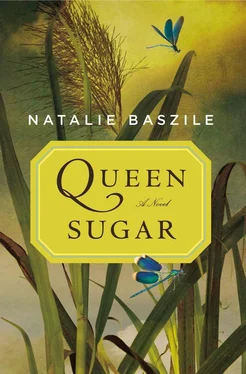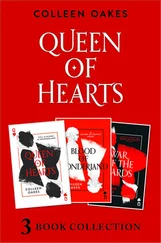Fred’s Hometown Discount in Lafayette had everything you needed to make your house a home. Charley and Micah were on their way to buy sheets and an air mattress, and had just pulled away from Miss Honey’s when Micah asked, “Is Miss Honey poor?”
Charley looked at Micah. Poor was bricks of government cheese in the freezer, she thought; poor was celebrities holding hands in the music video and singing “We Are the World” for starving children in Africa. She could spend a lifetime at Miss Honey’s and not think the word poor , and yet she understood why Micah asked. Saint Josephine was not Los Angeles. Why, just yesterday on her way to the farm, she spotted, way back in the woods, a rusted Airstream trailer marooned in a murky puddle. Graffiti was spray-painted in crooked blue letters across its front, and a tattered American flag, instead of curtains, hung in the window. Even Miss Honey’s house, which stretched from the broken sidewalk in front all the way to the woods out back, was nothing more than one hundred and twenty feet of raggedy tacked-on rooms, one after another like a line of boxcars.
“Miss Honey doesn’t have a lot of money, that’s true,” Charley said, “but no one’s ever gone hungry in her house.” Poor but not hungry. That was the phrase her father used whenever he described his childhood. Charley always took it to mean there was so much more to life than just money. There were family and friends, there was good, satisfying work, and knowing you had a place on this earth where you were loved and there was nothing to prove. Charley looked both ways at the end of the block even though no cars were coming. “What do you think?”
Micah held up the Polaroid. She surveyed the street through the viewfinder. “Everything in this town is broken,” she said. “Why is everyone black? Why do they stare every time we drive down the street?”
Charley laughed. “You’ll get used to it.” She thought back on their lives in LA with its wild mix of people: blacks, whites, Latinos and Asians, East Indians and Middle Easterners, no one staring at anybody.
At the edge of town, as Main Street fed into the two-lane and they picked up a little speed, Micah lowered her camera. She pressed her back against the passenger door and stared at Charley. “Are we poor because we live here now?”
“The Quarters”—the side of town where Miss Honey and most of the other black residents lived, a neighborhood that was literally over the railroad tracks — couldn’t have been farther from what Micah had known. The streets were sloppily paved, the sidewalks cracked. On the narrow houses, paint curled away from sun-bleached clapboard. Battered couches and rusty lawn chairs seemed to clutter every porch.
Charley shivered despite the sun shining through her window. Were they poor? She had two hundred and thirteen dollars after paying for the trip to Saint Josephine. Davis was so young when he died — just thirty-two — he barely had life insurance. She had a master’s in art history, which she’d still be paying for after Micah finished college, and nothing set aside for retirement. And though she didn’t want to admit it, she couldn’t have afforded to rent a house down here if she’d wanted to, had prayed Miss Honey would offer them a place to stay. And now, if she couldn’t find a manager, if she couldn’t whip her fields into shape and harvest a decent crop, she’d have squandered her father’s investment. Charley took a breath, twisted her wedding ring. “Not poor. Not exactly.” Not yet , she thought.
Ahead of her, Spanish moss hung in curtains from the live oaks, softening the light that fell through the branches and lent the road a hazy glow.
Micah opened the glove box, took out the map, and fanned herself. Seconds later, she kicked off the fleece-lined, shin-high suede boots she insisted on wearing despite Charley’s warning that it wasn’t boots weather, and propped her bare feet on the dash. She groaned. “It’s so hot .”
“I tried to tell you.”
Micah looked at her sideways, then reached to fiddle with the air conditioner.
Charley was just about to remind her that it was broken, tell her to leave it alone, when Micah’s sleeve rode up her arm, revealing her scar. An impulse shot through Charley and she brushed her hand over it.
“Stop it,” Micah said, pulling away. “I hate when you do that.”
Charley withdrew her hand, placed it back on the wheel. “Sorry,” she said, lamely, unable to reprimand Micah for her sharp speech. She could rationalize part of it: hormones. All the eye rolling, the crossed arms, and the sulking, even that clicking sound Micah made with her tongue to convey impatience or general disgust, it was part of growing up — that’s what the parenting books said, anyway. And she had flickering memories of herself at Micah’s age; remembered how sometimes the mere sound of her mother’s voice made the hair on her arms prickle, it was that grating; or how, downstairs in the garage after school one day, she burst into tears for no reason she could think of. Just burst into tears, shoulders shaking and nose running, as she stood there beside shelves of laundry detergent and paper plates and her mother’s old tennis rackets. So why get on Micah’s case when she knew it was just a phase?
But then there was the other part; the part that had nothing to do with hormones and everything to do with her guilt. And for the next few minutes, as she drove, Charley cursed for not catching herself before she touched Micah’s scar, for not thinking the moment through. Micah’s accusatory tone, her rejection, stung, for sure, but it could never match her own lacerating self-loathing, her own sickening shame.
Charley reached for the map. “We’re here,” she said, unfolding it and spreading it in the space between them, “and we’re trying to get there. You can be our guide.”
Micah drew the map closer, traced the road with her finger. She was quiet for a while, then said, “I want to go home.”
“Not again.” Charley was pleading. They had had this conversation — if you could call it a conversation with all the tears and pouting — a hundred times in the last ten months, like actors in a play.
Micah folded the map’s corner. Vinton, Sulpher, and Lake Charles disappeared into crisp accordion pleats. “I want to live with Lorna.”
Lorna was Charley’s mother, Micah’s grandmother, back in Los Angeles. She took Micah shopping, to the children’s symphony, and to tea at the Ritz Carlton on her birthday. Last summer she took Micah to Martinique and promised they would fly to Paris when Micah turned fifteen. Lorna’s house, a stately property with a towering wrought-iron gate out front, a gurgling cherub fountain, and olive trees lining the courtyard, was filled with framed pictures of the two of them. Charley was happy the two were close, was happy Lorna could provide for Micah in a way she simply couldn’t on her nonprofit salary; and yet, lately, Charley felt a stab of jealousy whenever Micah mentioned Lorna’s name.
“I still don’t understand why I have to—” Micah began.
“My God,” Charley cut her off. “What can I tell you? That ship has sailed. I’m not discussing it.” She brushed Micah’s hand from the wrecked map as Welsh, Jennings, and Crowley vanished into its creases. “I’m going to need that if you don’t mind.”
“Fine.” Micah shoved the map off her lap. It crumpled in the well beneath her feet.
Beyond the window, the landscape rushed by. How could there be so many shades of green? Cane fields the bright green of a new pippin apple, while the grass was almost jade, the woods the deep green of raw spinach, and the reflection of the sunlit trees along the bayou a vibrant chartreuse.
Читать дальше












